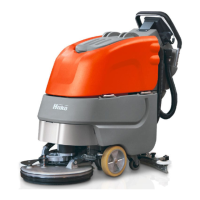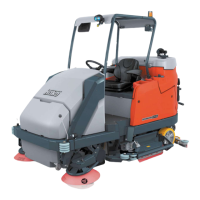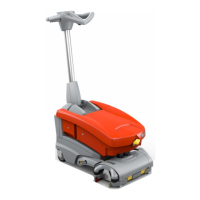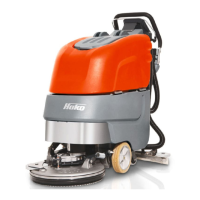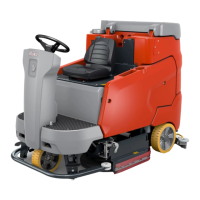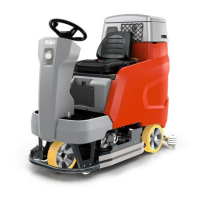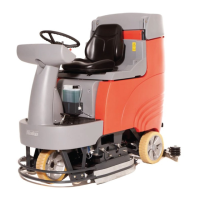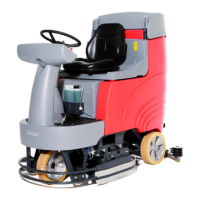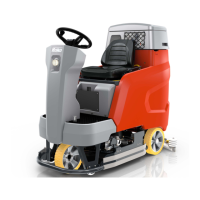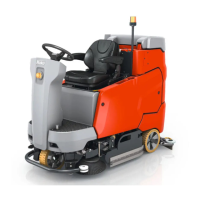Do you have a question about the HAKO Scrubmaster B45 CL DTC and is the answer not in the manual?
Introduction to the Scrubmaster B45 CL DTC, emphasizing user safety and manual importance.
Defines intended commercial use, manufacturer liability, and required operator qualifications.
Details warranty terms, exclusions, and requirements for claims.
Instructions for inspecting the machine upon delivery for transport damage.
Guidelines for rendering the machine inoperable and disposing of it locally.
Explanation of symbols used to denote safety precautions, hazards, and environmental concerns.
Covers compliance with laws, manual reading, operator training, and machine usage restrictions.
Details initial charging, operational checks, and operator attire/surface requirements.
Highlights risks related to electronics, power plugs, batteries, and specific operational hazards.
Information on safe use of substances and disposal regulations for detergents.
Identifies safety and warning labels attached to the machine and their importance.
Requirement for initial instruction by a qualified person before operating the machine.
Procedure for fully charging the battery before first use, and manufacturer liability.
Checklist for inspections before putting the machine into operation.
Procedure for turning the machine on using the key switch.
Step-by-step guide for operating the machine's various functions.
Advice for optimizing cleaning performance and using cleaning agents effectively.
Lists error codes, their causes, and recommended remedies.
Procedure for safely stopping and switching off the machine.
Tasks to be performed after finishing work, including cleaning and charging.
Guidelines for securing the machine for transport.
Overview of the Scrubmaster B45 CL DTC as a scrubber dryer.
Details on the brush head's function, lowering, and cleaning.
Information on filling, volume, and regulating cleaning agent quantity.
Description of the squeegee's function, lowering, and adaptation to the floor.
Details on vacuuming waste water into the recovery tank.
Explanation of the continuously adjustable traction drive and speed control.
Information on the machine's AGM batteries and the required quick-charger.
List of available optional accessories for the machine.
Listing of all control and indicator elements on the machine.
Detailed explanation of the indicator field, service, and charge status indicators.
Description of key switches, bail system, direction, and speed controls.
Explanation of buttons for silence kit, tool connection, dosage, and solution supply.
Procedure for ejecting and attaching the brush for maintenance.
Detailed description of specific operating elements and their functions.
Detailed technical specifications including dimensions, performance, and capacity.
Data on sound power, sound pressure, and vibration levels.
Technical details for the battery charger.
Importance of following maintenance schedules and using qualified personnel.
Record of maintenance tasks and intervals for tracking.
Daily and weekly maintenance tasks to be performed by the customer/operator.
Maintenance tasks for authorized workshops at 125 operating hours.
Maintenance tasks for authorized workshops at 250 operating hours.
Safety check maintenance for authorized workshops at 500 operating hours.
Information about the machine's battery system, charger, and connectors.
Details on extending usage time by intermediate battery charging.
Procedure for initial and regular battery charging, safety warnings.
Function of the TSG to prevent deep battery discharge.
Explanation of the battery charge status display.
Guidelines for replacing batteries with approved types by qualified technicians.
Advice on maintaining battery charge and referring to product sheets.
Information on proper disposal of used batteries.
Components and procedures related to the solution tank.
Procedure for filling the solution tank.
Procedure for emptying the solution tank.
Instructions for cleaning or replacing the solution filter.
Components and procedures related to the soiled water tank.
Procedure for emptying the soiled water tank.
Procedure for cleaning the soiled water tank.
Checking the functionality of the drain hose seal.
Checking the functionality of the tank lid seal.
Components and procedures related to the brush head.
Procedure for checking wear and replacing brushes.
Procedure for checking and changing the deflector roller.
Procedure for checking and replacing sealing strips on the brush head.
Procedures for cleaning and changing sealing strips on the squeegee.
Instructions for adjusting the angle of the sealing strips for optimal contact.
Procedure for adjusting the height of the squeegee rollers using washers.
Formal declaration of conformity with relevant safety and health directives.
